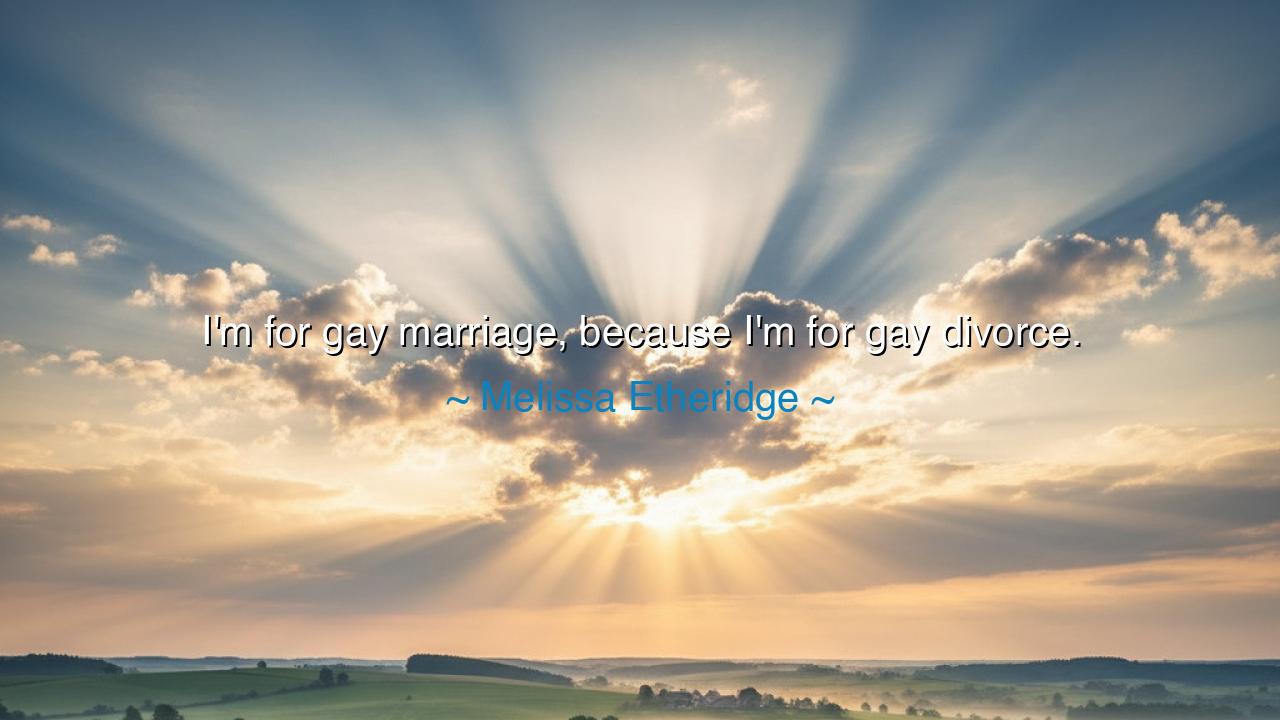
I'm for gay marriage, because I'm for gay divorce.






Hear now, O seekers of truth and balance, the words of Melissa Etheridge, singer of courage and voice of defiance, who once declared: “I’m for gay marriage, because I’m for gay divorce.” At first, these words may sound like jest — a flicker of humor from a soul both bold and unafraid. Yet beneath the laughter lies a profound wisdom, for in this saying, Etheridge captures the essence of equality, not in sentiment, but in reality. She reminds the world that true freedom is not only the right to love, but the right to fail, to part, and to rebuild — for it is only when all are subject to the same laws, both in joy and in sorrow, that equality truly lives.
Her words were born in an age of struggle, when the world still argued over whether love between two men or two women could be sanctified by law. Many spoke of marriage as sacred, as though it were a treasure to be guarded from some and gifted to others. But Melissa Etheridge, through wit and wisdom, stripped the debate of its fear. By invoking divorce, she revealed a truth both simple and disarming: that rights are not privileges of convenience, given only when they flatter society’s comfort, but the inalienable condition of being human. To be equal, one must share in both the blessings and burdens of law.
The meaning of her statement shines brightest when one understands its paradox. She does not speak of divorce with bitterness, but with clarity. For what is divorce, if not a recognition that people — gay or straight — are bound not by perfection, but by choice? And in that choice lies dignity. To deny one the right to marry, or to separate, is to deny one’s humanity — to say that some loves are too alien to be recognized, too fragile to be trusted with the freedoms others take for granted. Etheridge’s quip, then, is not mockery, but liberation: a declaration that to be treated equally under the law is to live fully, even in imperfection.
In the ancient world, the philosopher Solon of Athens wrote laws to bring justice to a divided people. He knew that order and equality do not come from shielding citizens from hardship, but from granting them the right to stand accountable before the same law. In this, Melissa Etheridge walks in Solon’s spirit. For equality cannot exist when one group is excluded from both the rights and the responsibilities of society. True justice, as she reminds us, does not favor — it balances. It gives to all the same opportunities, the same consequences, and the same recognition before the eyes of the world.
Let us look, too, at the story of h Windsor, whose love for her partner, Thea Spyer, defied both illness and prejudice. When Thea passed away, h faced not only grief but injustice: because their marriage was not recognized by federal law, she was forced to pay enormous estate taxes that no heterosexual widow would face. She took her case to the Supreme Court, and in 2013, justice was done — the Defense of Marriage Act was struck down. In that victory, the world was reminded that equality is not abstract; it lives in paperwork, in taxes, in inheritance, in both marriage and divorce. Etheridge’s words echo this truth — that equality must reach into the smallest details of daily life, for only then does it become real.
Her wisdom also carries a note of humility. For marriage, however noble, is not a fairy tale. It is a human bond, fragile and powerful, full of struggle as much as sweetness. To be granted the right to marry is to be trusted with all that it entails — to join, to separate, to grieve, to begin again. Thus, when Etheridge says she supports gay divorce, she affirms the fullness of human experience. She does not ask for special treatment, only for equal standing in the eyes of love and law alike. Her words remind us that justice is not found in idealizing life, but in embracing it as it is — flawed, beautiful, and ever-changing.
And so, my children, let this be the lesson: equality is not perfection — it is participation. It is the right to walk the same path as every other human being, to stumble, to rise, to begin again. Do not seek fairness only in glory; seek it also in imperfection. For love that is protected only in success is not love, but vanity. Love, to be true, must be free — free to thrive, and free to end.
Therefore, take from Melissa Etheridge’s wisdom this call to action: if you would defend equality, defend it wholly. Do not demand only the privileges of joy, but the responsibilities of sorrow. Stand for justice that is complete, not partial — for a freedom that encompasses all of life, from its triumphs to its failures. For only when every soul, regardless of whom they love, may stand equal before both love and law, can we say, with truth and honor, that we have built a just and human world.






AAdministratorAdministrator
Welcome, honored guests. Please leave a comment, we will respond soon